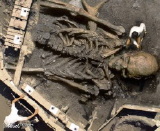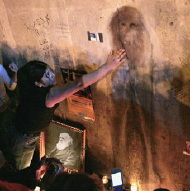Ken Campbell and the Royal Dickens Company —
Ken Campbell recently died at the age of 66.
The Telegraph's obituary describes him as "an actor, writer and director of wilful eccentricity" who worked in experimental theater. However, he was perhaps best known for a hoax he pulled off in 1980, when he sent around letters announcing that the Royal Shakespeare Company was renaming itself the Royal Dickens Company.
I couldn't find a good description of this hoax online (and, unfortunately, I've never gotten around to writing one up... so many hoaxes, so little time). So here's an account of the hoax from Nick Yapp's book
Great Hoaxes of the World:
In 1980, Campbell went to the Royal Shakespeare Company's production of Nicholas Nickleby. A friend in the cast told him that Trevor Nunn, the producer of Nicholas Nickleby, had encouraged the cast at rehearsals to adopt the style of The Ken Campbell Road Show in their approach to parts of the play. Although Campbell sat in the front row, and enjoyed what he saw, the link with his own Road Show escaped him. After the performance, he went backstage where one of the cast had a bowl of fruit in his dressing room. Friends were invited to help themselves from this bowl, but there was a catch in the banana. If anyone touched it, it turned into a penis. Campbell says that it was this that in some way inspired him to create his hoax.
With the help of a couple of friends, Campbell had some headed writing paper printed, a perfect replica of the Royal Shakespeare Company notepaper, save for the replacement of 'Dickens' for 'Shakespeare', and 'RDC' for 'RSC'. He also discovered that Trevor Nunn signed his letters 'Love, Trev'. Campbell wrote dozens of individual letters to actors, writers, directors, producers, designers and composers, as well as to Sir Roy Shaw of the Arts Council. A typical letter read:
Dear X,
As you probably heard there has been a major policy change in our organization.
Nicholas Nickleby has been such a source of real joy to cast, staff and audience that we have decided to turn to Dickens as our main source of inspiration.
So that'll be it for the bard as soon as our present commitments decently permit.
There followed a suggestion for the next production: Sketches by Boz, Bleak House, or The Pickwick Papers. Each letter ended with an individually tailored invitation. For Lindsay Anderson, Campbell signed off with: 'Thinking of you brings The Old Curiosity Shop to mind. What a coup if you could bring Sir Ralph and Sir John together again in a script by David Storey. I feel your cool, intelligent approach is going to be badly needed in these new times.' Max Stafford Clark was offered Barnaby Rudge as a production: 'I find this a compelling piece which could be admirably served by your sparse, clear directorial style -- especially if the whole sweep of the book could be captured with the aid of no more than six chairs.' Norman St John Stevas, the Arts Minister, was told: 'The first production of the RDC is hoped to be Little Dorrit. Any thoughts you have on this will, as always, be treasured.' To accompany the letters and add punch to the campaign, the Aldwych Theatre was covered in RDC posters, in the style of the RSC, giving advance notice of the production of Little Dorrit.
The RSC production of Nicholas Nickleby was spread over two nights, and it was a few nights later that Campbell went to see the second half. He was told that the letter had not gone down well, and that Trevor Nunn had called in the Special Branch. There was no suspicion on Campbell, as Nunn believed it was an inside job. Newspaper reports of the hoax grandly exaggerated the affair, saying that 'thousands of sheets' of RDC notepaper had been printed, and that 'hundreds of letters' had been sent. Trevor Nunn was reported as saying: 'It is deeply embarrassing; a lot of people have written to me refusing, or, even more embarrassing, accepting the offers'.
Some months later, while Campbell was working at the Everyman Theatre, Liverpool, he was phoned by a researcher from the BBC TV programme Newsnight, who accused him of being the RDC hoaxer. Campbell denied it at first, and consulted with his accomplices, who offered him mixed advice. He decided to come clean, and was asked to appear on Newsnight. In the television studio, where he made his confession, he was horrified to see himself, on a monitor, lit like a terrorist, a sinister, dark figure in silhouette. But the affair blew over with no harm done and no recriminations.

 U.S. Army Releases Doctored Photographs
U.S. Army Releases Doctored Photographs Oswald's Backyard Photo
Oswald's Backyard Photo Giant Human Skeleton
Giant Human Skeleton Francis Hetling's Victorian Waifs
Francis Hetling's Victorian Waifs The Yale Center for British Art is hosting an exhibition about an obscure 18th-century art hoax (one that I had never heard of before). The exhibition is titled "Benjamin West and the Venetian Secret" -- which makes it sound a bit like a new Harry Potter novel. From Art Knowledge News:
The Yale Center for British Art is hosting an exhibition about an obscure 18th-century art hoax (one that I had never heard of before). The exhibition is titled "Benjamin West and the Venetian Secret" -- which makes it sound a bit like a new Harry Potter novel. From Art Knowledge News: A woman walking her dog in the Welsh countryside recently found an empty coffin sitting in the middle of a field. The coffin had a note in it: "Jump in, you're next."
A woman walking her dog in the Welsh countryside recently found an empty coffin sitting in the middle of a field. The coffin had a note in it: "Jump in, you're next." Researchers have determined that the Chi-Rho Amulet, found in Shepton Mallet in 1990, is a fake. When it was first discovered in a Roman grave eighteen years ago, it was thought to be the earliest Christian artifact ever found in Britain. Local residents were so excited by the discovery that they named an entertainment center and a street after it. But tests indicate that the silver in the amulet is of nineteenth-century origin.
Researchers have determined that the Chi-Rho Amulet, found in Shepton Mallet in 1990, is a fake. When it was first discovered in a Roman grave eighteen years ago, it was thought to be the earliest Christian artifact ever found in Britain. Local residents were so excited by the discovery that they named an entertainment center and a street after it. But tests indicate that the silver in the amulet is of nineteenth-century origin. Designed to deter sandwich thieves. Green splotches are printed on both sides: "After your sandwich is placed inside, no one will want to touch it."
Designed to deter sandwich thieves. Green splotches are printed on both sides: "After your sandwich is placed inside, no one will want to touch it."
 I couldn't resist linking to this piece from The Onion:
I couldn't resist linking to this piece from The Onion: